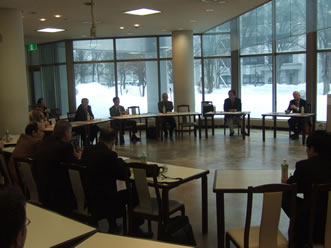| Annual Newsletter of the Slavic Research Center, Hokkaido
University |
Japanese English |
-->List
of All Publications-->Annual
Newsletter-->no.17 |
|
| No.17, January 2010 |
|||
| Our Current Staff |
Ongoing Cooperative Research
Projects |
Visitors from Abroad |
Guest Lectures from Abroad |
Publications (2008-09) |
The Library |
Website Access Statistics |
| Essays by Foreign Fellows |
||
| Andrew Gentes |
Dariusz Kołodziejczyk |
Marina Mongush |
The Slavic Research Center Held the International Symposium, "The South Ossetian Conflict and Trans-border Politics in the Black Sea Rim" on March 5–6, 2009
The Slavic Research Center holds large-scale international symposia twice a year, inviting about ten to fifteen foreign scholars. Usually, preparations start more than a year before the event. This time, during the period of preparation, the Second South Ossetian War took place in August 2008 and increased the symposium’s actuality. The original purpose of this symposium was to create a new scholarly community of specialists of this region. Hitherto, Slavicists (or post-Sovietologists) have been studying the northern Black Sea Rim, whilst its southern part is entrusted to Turkey or Near East specialists. This division of labor took shape during the Cold War and still continues to limit researchers’ perspectives. We find this division harmful to the further study of this region.
 |
| A scene from luncheon |
After the Second South Ossetian War, I, as the organizer, made much of the following interrelated principles. First, we should listen to local voices and the opinions of all parties of conflict without discrimination or prejudice. Second, we should overcome the understanding of the Black Sea Rim as a mere field of global competition. According to this understanding, local actors would appear only as puppets of the great powers. The composition of paper presenters eloquently demonstrates our position: five scholars each from Japan and Turkey, three from Russia (one of them an Ossetian), two each from Britain and Ukraine, and one each from Georgia and the United States.
Hokkaido University generously financed this symposium, which was held at the university’s new institute, named the Creative Research Initiative "Sosei."
Speakers of the Symposium
MATSUZATO Kimitaka